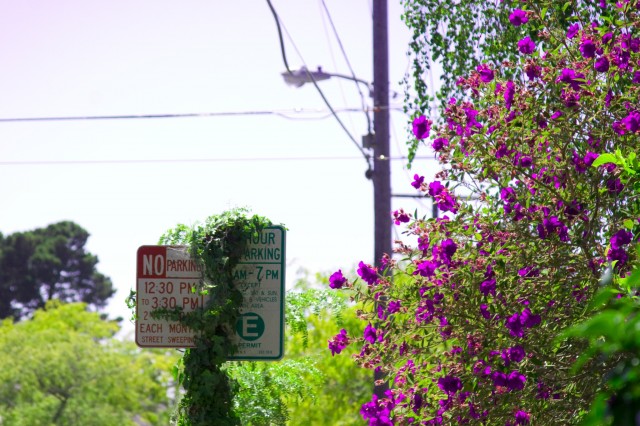Residents would have to opt in to the program by garnering the support of at least 51% of homes per block face. In addition, a parking survey would need to show that at least 75% of available street parking is occupied at mid-morning and mid-afternoon.
Last year, the city launched a pilot program called goBerkeley to change its approach to metered parking in several commercial areas to improve the visitor experience and cut down on emissions caused by drivers circling for a spot. With the permit parking program, the city now plans to take a closer look at neighborhood parking in residential areas, which was not part of goBerkeley.
Tuesday night, two speakers addressed council about the proposal, which was submitted by Public Works director Andrew Clough and prompted by “periodic interest” in permit parking expansion expressed by council members.
One local resident told council she wasn’t sure she wanted to have to pay more to park in her own neighborhood, or to host visitors who need to park on the street.
John Caner, who runs the Downtown Berkeley Association, told council the city might want to consider protecting the ability of city staff to park in residential areas around Sacramento Street. He noted that downtown garages are already full, and that many city staff cannot afford to park in them.
On the other hand, Councilman Jesse Arreguín said he’s heard from many residents around California Street and Spaulding Avenue who are frustrated by the number of city staff who park in the neighborhood. He said there needs to be a balance in residential areas between “providing parking for people who work downtown” and “neighborhood character.”
As the program currently works, on roughly 1,600 “street segments,” parking for longer than two hours — in most areas — is reserved for permit holders from 9 a.m. to 7 p.m. weekdays. Some blocks also require permits on Saturdays.
The city hopes expanding the program might push more people who drive to use public transportation, which could decrease congestion and emissions. On the flip side, it may also lead to increased “rotation” as drivers who don’t opt for public transportation would need to move their vehicles more often to comply with the two-hour time limit.
The city estimates that 300 more blocks might be included in the program once the new environmental study is done. Expanding the program to those blocks would lead to additional costs, however, and the program already loses money, according to the staff report. (An exact amount was not specified.)
Staff estimate that the expansion could cost more than $1 million to implement: nearly $800,000 to hire 7.6 parking enforcement officers; nearly $80,000 for 7.6 vehicles for them to drive; an estimated $150,000 for signage, at $500 per block; and $70,000 in program management costs for staffing.
Additional costs related to permit renewals, printing and postage, citation processing and the adjudication of contested citations have not been determined.
Council said, as part of the process, the city should investigate the possibility of raising the annual permit fee so it covers more program costs. Currently, an annual permit costs $45. Officials said it might be wise to look at an escalating fee for households with numerous vehicles.
City of Berkeley Transportation Division manager Farid Javandel said Tuesday that he didn’t have an estimate for how much the environmental study will cost to complete, but noted that the expenses listed above, particularly for enforcement, would likely be of more significance.
Javandel said he hopes to return to council in February with a proposed timeline and estimated cost for the environmental study.
Councilwoman Susan Wengraf said Tuesday night that the city is going to need to think more broadly about parking going forward. She said there is an “inherent conflict we have about parking,” and that the city needs to build more parking structures downtown to help ease the tension.
Wengraf said many people do use BART to get to the city, but that the transit system doesn’t serve all of the surrounding communities. She also noted that the city doesn’t have the staff “to do simple things,” and wondered how an increased workload would be handled.
“We’re moving in one direction but we’re not doing anything to alleviate the whole problem,” she said. “I think we really do have a citywide problem with parking. And we’re not really addressing it in a comprehensive way.”
Councilman Max Anderson said the situation is only going to get worse as the city increases in density. He said Berkeley’s population rose from 99,000 in 2000 to 114,000 now.
“That increase in population alone adds to the problem and, as we build more structures that attract people and are destinations, we’re going to have even more people coming,” he said. “In a sense, there’s a problem that accompanies success, and we have to be able to address the increased demand.
I don’t think we’ve done that so far.”

